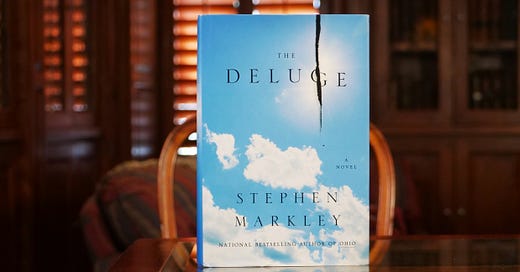Brilliant, terrifying, maddening, enlightening, frustrating, prescient, conspiracy-fueling, rage-inducing, and tear-jerking. Those are just a few of the descriptors I'd apply to Stephen Markley’s The Deluge, his mammoth 2023 novel that contemplates humanity's potential path to mammoth-like extinction due to climate change and the resulting collapse of social order.
It's a wordy, wonky and overstuffed epic that follows a wide range of interconnected characters who variously attempt to stop, delay, deny, exploit or merely survive the slow-motion climate apocalypse that unfurls over the course of thirty years (2013-2043) in the novel.
It's only barely classifiable as speculative science fiction—nearly all of the technology described in it already exists and its climate science has been studied for decades and is now widely accepted. It's really more of an eco-techno-political thriller . . . written in the style of a Vox.com columnist channeling their inner Thomas Pynchon.
It's what Neal Stephenson's 2021 climate fiction novel Termination Shock wanted to be, but failed at. It complements and improves upon Kim Stanley Robinson’s 2020 clarion call The Ministry for the Future that covered similar ground (with Robinson adopting a global perspective while Markley focuses primarily on the US). Markley crafts the better story, though, with interesting, empathy-fostering characters, expertly ratcheted tension, and judicious amounts of spectacle and surprise to keep readers from feeling like they’re drowning in climate policy debates.
The Deluge is an unapologetically political novel that advocates on behalf of humanity rather than for a specific political group or ideology. It isn't afraid to direct its fierce criticisms at nearly every political persuasion. Markley clearly intended it as a wake-up call—to build awareness of the gravity of potential climate risks in the coming decades and to spur action to do something about it.
Did I mention that it's brilliant? This is an essential read, although its structure and writing style are probably too dense, too convoluted, and too crowded with minor characters, POV switches and time jumps for many readers' tastes. I also have mixed feelings about the novel's ending. Nevertheless, I highly recommend this book. Markley accomplishes the almost impossible feat of making a 900-page novel about the messy process of building a political movement for climate legislation a compelling read.






